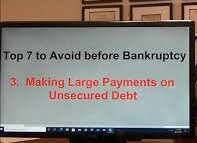By David J. Kelly, Minnesota Bankruptcy Lawyer
If you’ve been reading my stuff, you know that I have a list of what I consider the top seven things you should avoid before filing a bankruptcy, either Chapter 7 or Chapter 13. This is the third in a series and is about item three on my list – making large payments to unsecured creditors.
The bankruptcy code follows the general principal that all your creditors are supposed to be treated equally – damaged equally in proportion to the amount of each debt. To try and level the playing field among the unsecured creditors, a limit is set on how much you can pay each one within the 90 days before the filing of your case. If you have paid a total of over $600 to any one unsecured creditor in the 90 days prior to filing the case, this is considered what they call a “preference.” Having a preference can slow down the administration of your case, not to mention that making those payments is a waste of your money. Save the money to pay your attorney fee and court filing fee.
A preference is considered to be one of your assets, but it’s not one you can claim as exempt. In a Chapter 7 bankruptcy case having a preference means that the trustee can claw the money back from the one creditor and distribute it equally to all the creditors. While this process is going on, your court file remains open and you are not able to start rebuilding your credit. In a Chapter 13 bankruptcy it means you may have to pay extra in your payment plan to make up for what the creditors would have received had it been a Chapter 7. In Chapter 13 they call that the best interests of the creditor rule. You can’t give the unsecured creditors less in a Chapter 13 than they would have received in a Chapter 7. Either way, whether it’s Chapter 7 or Chapter 13, the result is undesirable.
Once a case is filed, my goal is always to get out of the case as quickly as possible. So a preference is usually something I want to avoid. They way to avoid the issue to quit paying the unsecured creditors and wait until you have a 90 day period free of preferences. There are always exceptions. The preference might not be the worst thing in the world. For example, if there is a wage garnishment in progress I might say let’s get the case filed ASAP anyway.
When asked my clients almost always say that they have not paid over $600 to any unsecured creditor in the last 90 days. But then I point out that all you have to be doing is paying over $200 per month, and that will always add up to over $600 in 90 days. At that point a light bulb seems to come on and I learn that there is a preference hiding there somewhere.
Keep an eye out for the next episode – Item Four – Drawing Down your 401K.






